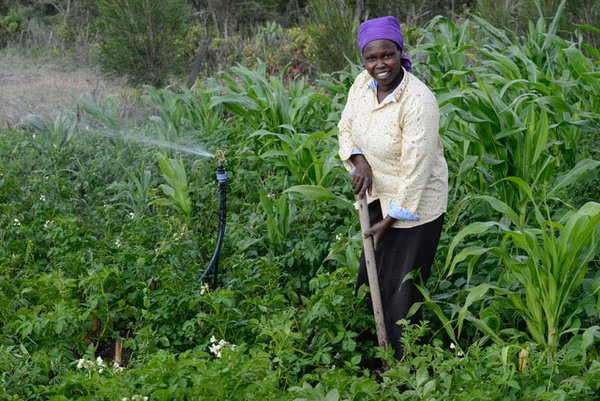 Download this article in magazine layout
Download this article in magazine layout
- Share this article
- Subscribe to our newsletter
Unlocking the potential of agroecological approaches – the Transformative Partnership Platform on Agroecology
The Transformative Partnership Platform on Agroecology (TPP) emerged in early 2020 to follow up on the High Level Panel of Experts (HLPE) of the Committee on World Food Security (CFS) report on agroecology and a dialogue between CGIAR and French research institutions. Incubated by the latter and World Agroforestry (ICRAF), but soon attracting other partners across the UN and CGIAR systems, the TPP addresses evidence and implementation gaps constraining agroecological transitions, and uses resulting evidence to underpin advocacy and inform policy-makers about the potential of agroecological approaches to improve livelihood and landscape resilience. These twin objectives involve working in new ways, bringing together research and development, science and social movements, and local and scientific knowledge through transdisciplinary science and the co-creation of knowledge. The TPP aims to facilitate the integration of the work of global partners on identified priority areas where progress is needed to unlock the potential of agroecological approaches.
Currently, the TPP operates across eight demand-driven domains covering socio-economic viability of agroecological practices; linking diversity resilience; soil health; developing holistic performance metrics; pest, disease and weed control; policies and institutions; nutrition; and water management. Together, these address the broken food system globally to deliver ways of farming that are more in harmony with nature and food systems in which all actors, from producers to consumers, have agency in determining how food is produced, processed, transported, sold and consumed.
Since emerging in 2020, the TPP has rapidly gained momentum. It has a portfolio of projects to a value of 100 million US dollars (USD), 25 million of which supports TPP initiatives and the rest aligned projects. A TPP ‘integrated project’ is conceived in a partnership that includes TPP participants and meets the following requirements: it is led by a TPP partner organisation, contributes to the TPP’s objectives, is managed within the overall framework of the TPP, remains fully in line with the 13 HLPE agroecological principles (see upper Box on page 31) and follows the TPP’s operational modalities. TPP ‘aligned projects’ were originally conceived and managed outside the TPP but are aligned with the TPP objectives and modalities, with clear linkages bringing added value of alignment both for the project and for the TPP. Some examples are given in the following.
‘Documenting and evaluating the socio-economic viability of agroecological practices across Africa’. The three-year, four million euro, French-funded ‘viability project’ was the first research priority to be addressed. The project aims to better understand the socio-economic viability of agroecological practices in terms of livelihood impacts including assessments of labour, income, and intra-household levers and lock-ins. Twelve case studies have been selected which cover a diversity of demographics, geographies and agroecological practices across Africa. The case study teams involve the NGO Sustainable Agriculture Tanzania, the French Agricultural Research Centre for International Development (CIRAD), the French National Research Institute for Sustainable Development (IRD), several CGIAR centres (ILRI, ICARDA, CIMMYT, ICRAF, IWMI, Bioversity International/CIAT) and Cornell University (USA) with data management support from the social enterprise Stats4SD – Statistics for Sustainable Development. A mixed-methods common protocol has been developed which is now being applied in each of the diverse local contexts and will enable generalisation across them to deliver generic lessons that can inform policy-makers. The project operates in Tanzania, Senegal, Tunisia, Madagascar, Ethiopia, Zimbabwe, Ethiopia, Burkina Faso, Kenya, Ethiopia and Malawi.
‘Scaling Responsible and Inclusive Business Innovation in Agricultural Land Investment that Supports Rights, Livelihoods and Sustainable Food Systems’ is a three-phase, eleven-year project co-funded by Swiss Development Cooperation (SDC) which secured combined funding of 10.5 million Swiss francs for the first three-and-a-half-year phase in 2020 and is still in its initial stages. The goal of the project is to support transitions to sustainable and inclusive food systems through enabling and incentivising land-based investors and their partners to develop gender-sensitive land policies that are consistent with voluntary guidelines on responsible governance of tenure and to develop business models that are sustainable and inclusive. This is to be achieved by focusing on land-based investments that avoid environmental and socio-economic harms and by working on transitioning current and potential land-based investments away from monoculture-oriented business models towards inclusive models founded on agroecological principles. Three sets of activities will be carried out within the framework of the TPP to achieve the project’s goal: co-development of an investment risk-reward model, national-level responsible business innovation labs and national multi-stakeholder learning labs. The project focuses on Ethiopia, Mozambique, Ghana, Laos and Myanmar, and is led by CIFOR-ICRAF with consulting Land Equity International, the Thailand-based Center for People and Forests (RECOFTC) and SNV Netherlands Development Organisation as partners.
A fast-developing science-policy interface is reflected in a series of TPP side events this year, for instance the Fifth Section of the United Nations Environment Assembly (UNEA 5), the 48th session of the CFS (CFS 48), the UNFSS Pre-Summit and a TPP-run ‘Policies for Agroecology’ online event.
Cheryl Heath is TTP Coordinator at ICRAF in Nairobi, Kenya.
Contact: c.heath@cgiar.org
Fergus Sinclair is TPP Co-convenor and Chief Scientist at CIFOR-ICRAF.
Etienne Hainzelin is TPP Co-convenor and Advisor to the CEO of CIRAD.
For further information please visit the TPP web-platform: https://glfx.globallandscapesforum.org/topics/21467/page/TPP-home





Add a comment
Be the First to Comment